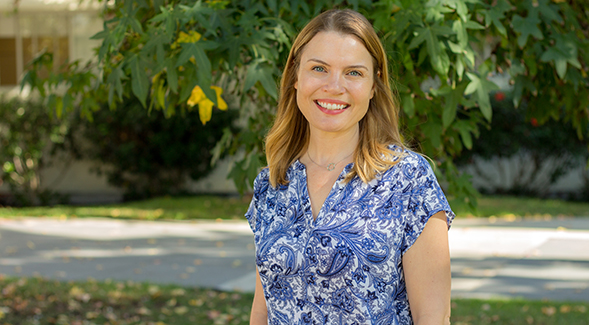A Partnership to Train the Trainers in Special Education
Jessica Suhrheinrichs $5.5 million grant will lead to increased support for teachers of students with autism spectrum disorders.

Early in her career, Jessica Suhrheinrich worked with children with autism spectrum disorders as a behavior therapist, and later taught fifth grade in rural Louisiana through Teach for America. These experiences taught her a lot about what was broken in special education. They also inspired her to devote her career to fixing the problem.
“I got firsthand experience with the inadequacy of the professional development that's often offered to teachers.” said Suhrheinrich, a San Diego State University assistant professor in special education. “I just developed a passion for increasing the quality of publicly available educational support for students with autism.”
A $5.5 million grant award from the California Department of Education will further Suhrheinrich’s work in a big way. The grant, awarded to Marin County Special Education Local Plan Areas, will support the scale-up of evidence-based practices for students with autism through a partnership with the California Autism Professional Training and Information Network (CAPTAIN), a cross-agency network devoted to improving autism education in the state. Evidence-based practices are identified by research as the most likely to lead to the best educational outcomes for students.
The project will partner with the UC Davis Medical Investigation of Neurological Disorders (MIND) Institute under the direction of CAPTAIN co-director Patricia Schetter of the MIND Institute's Center for Excellence in Developmental Disabilities. Suhrheinrich, a member of CAPTAIN’s leadership team, will serve as director of research and analysis. Her SDSU team will collect information on student and teacher progress, analyze data, and manage and measure training and coaching protocol.
“I’m delighted to congratulate Dr. Suhrheinrich on this exciting news,” said Y. Barry Chung, dean of the College of Education. “This is a wonderful example of how our college’s faculty are making a positive difference in our community. Improving education for young people with autism is essential work, and I’m proud to have one of our researchers on the forefront of these efforts.”
A game-changer
According to a 2018 report by U.S. Centers for Disease Control and Prevention (CDC), one in 59 U.S. children has autism, a disorder causing challenges in social skills, communication and other areas. That represents a 15 percent increase in autism diagnoses in just two years.
Over the past five years, CAPTAIN has attempted to improve outcomes for this growing population. Following what Suhrheinrich calls a “train the trainer” model, CAPTAIN recruits a cadre of educators from around the state and develops their skills to provide coaching and support in evidence-based practices to their home agencies.
Suhrheinrich calls the California Department of Education grant “a huge game-changer” as it will allow CAPTAIN to build greater infrastructure, including the hiring of a director of training and technical assistance to support the cadre, as well as regional leads who can provide support directly to school districts and local education agencies. Regional leads will be trained to conduct classroom assessments to establish a baseline for identifying the types of supports that are needed.
“For too long there’s been the misconception that you can provide some initial training to a teacher and they will be able to use those new strategies in their classroom,” Suhrheinrich said. “Research has shown us that in order to integrate new strategies, teachers need not only the initial training, but also ongoing coaching, leadership support within their organization and resources to ensure that they can continue to do the good work they've started."
Drawn to SDSU
Suhrheinrich, a former professor at the University of California, San Diego, and research scientist at Rady Children's Hospital, joined the SDSU faculty in 2016. She said she was drawn to the university’s special education department because of the high level of autism expertise within its credential and master’s degree programs.
“This position has really allowed me to bring together my professional interests,” Suhrheinrich said. “I get to train teachers in ways that will impact their classroom practice and continue research into how organizational factors affect implementation and sustainment."



